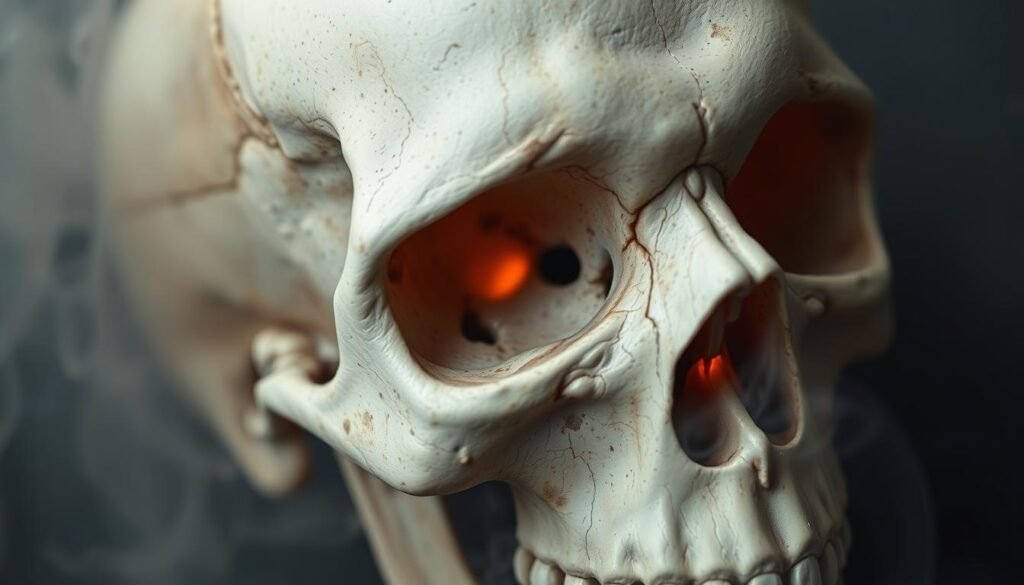Every year, nearly 29 million adults in the US get sinus infections. These infections can cause a lot of symptoms that make daily activities hard. They can lead to nasal congestion, facial pain, and even fatigue. You might wonder, can a sinus infection make you tired? It’s important to understand how sinus infection symptoms can affect your overall health. By knowing the link between sinusitis and fatigue, you can find better treatments. For more detailed info, check out MedlinePlus on sinusitis.
Key Takeaways
- Sinus infections can lead to a range of symptoms, including fatigue.
- Chronic sinusitis may require specific diagnostic tests like CT scans.
- Effective management of sinus infection symptoms is crucial for overall well-being.
- Understanding the impact of sinusitis on energy levels can help in recognizing its effects.
- Seeking early treatment can prevent complications associated with sinus infections.
Understanding Sinus Infections
A sinus infection happens when sinuses’ lining gets inflamed, causing them to swell. These sinuses are spaces behind the forehead and cheekbones, linking to the nose. They’re key for breathing well. Getting why sinus infections start means knowing the triggers and risks involved.
What is a Sinus Infection?
A sinus infection or sinusitis occurs in two types: acute and chronic. Acute sinusitis is short, lasting about a month. Chronic sinusitis lasts much longer, from four to twelve weeks, maybe even years. Knowing this difference is critical for getting the right treatment.
How Sinus Infections Develop
Several factors can cause sinus infections, such as:
- Viral infections, like the common cold
- Bacterial infections, especially after a cold stays too long
- Allergies and things in the environment that irritate the sinuses
- Existing issues, like nasal polyps or problems with nasal structure
People with weak immune systems might get sinus infections more often. It’s vital to know what leads to these infections for better understanding and prevention. Managing them well means avoiding colds and using strategies such as humidifiers and reducing contact with allergens.
Common Symptoms of Sinus Infections
It’s key to recognize the symptoms of sinus infections early. Many people notice various signs that point to a sinus infection. This makes it important to listen to what your body is saying.
Nasal Congestion and Discharge
Nasal congestion is a clear sign of sinus infections. This happens when sinus tissues swell and block airflow. Alongside, you’ll see thick nasal discharge, colored yellowish or greenish. This can lead to irritation and cough as it drips down the throat.
Facial Pain and Pressure
Facial pain is another major symptom, felt around the forehead, cheeks, and eyes. This pain is from mucus buildup and inflammation in the sinuses. The pressure can become very intense. As inflammation gets worse, the facial pain makes daily tasks hard to do.
Potential for Ear Pain
Sinus infections can also affect your ears. Many people feel ear pain from the pressure in their sinuses. This ear pain is a warning that you might need to see a doctor to avoid more issues.
Can a Sinus Infection Cause Fatigue
Have you ever felt extremely tired during a sinus infection? This could be why. Sinus infections, or sinusitis, can make you feel very tired. This happens as your body fights the infection.
This tiredness is linked to your immune system being active. Up to 22% of people with sinusitis feel very tired. They report chronic fatigue.
Immune System Activation
When you get a sinus infection, your immune system starts fighting it. This fight uses a lot of energy. It can leave you feeling very tired.
Your body uses its resources to combat the infection. This might be why you feel more tired than usual. It’s the body’s way of dealing with the infection efficiently.
Inflammatory Response and Tiredness
The way your body fights infection can also make you tired. Cytokines, released during the infection, make you feel not so great. They connect sinusitis and tiredness.
Besides, if you can’t sleep well, it makes you even more tired. This often happens due to nasal congestion. Many people with sinus issues feel more tired than those who don’t have them. This shows how important it is to take care of your sinus health.
The Link Between Sinusitis and Fatigue
Chronic sinus issues often lead to feeling tired. This happens because the sinuses stay swollen, causing discomfort. You might also have more mucus, making you feel worn out. Knowing how these are connected helps in tackling sinusitis and its tiring effects.
Understanding Chronic Sinus Problems
Chronic sinusitis means the sinuses are inflamed for weeks. This long-term inflammation can drain your energy, even after the infection seems gone. Using meds like decongestants might help, but they can also make you sleepy.
Impact on Sleep Quality
Sleep is essential for getting better, especially if you’re dealing with sinus-induced fatigue. Stuffy noses can ruin a good night’s sleep by making it hard to breathe. This not only affects rest but leaves you feeling tired all day. Drinking plenty of fluids can thin the mucus, easing some sinus issues.
Dealing with chronic sinusitis also means looking at how your daily habits affect your health. Eating well, reducing stress, and staying active can make a big difference. A diet full of vitamins can boost your immune system and help your energy levels bounce back.

Sinus Infection Symptoms Beyond Fatigue
Sinus infections bring more troubles than just feeling tired. They can cause sinus headaches and post-nasal drip. These issues make daily life hard and disrupt normal activities.
Sinus Headaches
Sinus headaches come from too much pressure in the sinuses. This pressure leads to facial pain and discomfort. It’s often due to inflammation from sinus infections, causing a dull or throbbing pain.
Common complaints include:
- Pain around the eyes and forehead
- Increased pain when bending over or straining
- Pressure that can lead to more headaches or migraines
To manage sinus headaches, nasal decongestants can help ease pressure. But, it’s important not to use some sprays too much. They might cause more congestion in the long run.
Post-Nasal Drip and Its Effects
Post-nasal drip is when too much mucus collects in the nose and drips down the throat. It can cause:
- A cough, mainly at night
- Throat irritation or soreness
- Sleep troubles due to discomfort
This symptom is annoying and can mess with your sleep, making you more tired. But, with the right methods, you can handle these symptoms better and feel well again.
| Symptom | Description | Potential Management Strategies |
|---|---|---|
| Sinus Headaches | Pressure and pain in the facial area due to sinus inflammation. | Nasal decongestants, hydration, rest, and pain relievers. |
| Post-Nasal Drip | Accumulation of mucus in the throat, leading to irritation and coughing. | Staying hydrated, using saline sprays, and elevating the head during sleep. |
Recognizing these symptoms helps you find ways to improve your life. Knowing how sinus headaches and post-nasal drip link together is key. It pushes you to tackle sinus infections fully for a better health.
How Sinus Infections Affect Daily Life
Sinus infections can really mess up your day. They bring physical pain and drain your energy. When you’re dealing with one, simple tasks become hard. You might feel stuffy and have pain in your face. This makes staying on top of your regular stuff tough.
Impact on Energy Levels
Fighting off a sinus infection uses a lot of your energy. This can make you feel super tired. Sleep can also be hard to come by because you can’t breathe well. Not getting enough rest makes you more tired during the day. This makes it hard to do your daily things or have fun with friends.
Consequences for Work and Social Interactions
Being tired all the time affects work and hanging out with people. You might not do your best at work, which can make you less motivated. Trying to socialize when you’re feeling bad isn’t fun, so you might not see your friends much. This can lead to feeling frustrated and like you’re missing out. If it keeps up, it might even make you feel down or hurt your relationships.

Natural Remedies for Sinus Infection Symptoms
Natural remedies are key in easing sinus infection discomfort. Using these methods daily can help handle symptoms. They also strengthen the immune system, improving overall health.
Foods to Boost the Immune System
Eating foods full of nutrients is crucial for immune health. Foods high in vitamins and antioxidants help protect the body. Great choices include:
- Citrus fruits: They’re full of Vitamin C, which helps reduce inflammation.
- Leafy greens: Packed with vitamins to boost immune strength.
- Garlic: Its antibacterial properties can enhance health.
- Spicy foods: These can open nasal passages, offering temporary relief.
Hydration and Its Importance
Drinking enough fluids is critical with sinus infections. Proper hydration makes mucus thinner, aiding in drainage. This reduces pressure and discomfort. Good hydration sources are:
- Water: The top choice for staying hydrated.
- Herbal teas: Offers soothing effects and adds to hydration.
- Broths and soups: They hydrate and provide extra nutrients.
These natural remedies give people ways to manage sinus infection symptoms. They help in the path to feeling better.
Medical Treatments for Sinus Infections
Understanding how to manage sinus infections is key. Many wonder when to seek help and what home remedies work.
When to Seek Medical Help
If symptoms last more than ten days or get worse, see a doctor. Severe facial pain, fever, or vision changes are red flags. Chronic sinusitis means symptoms last and inflammation is constant. This needs special medical attention.
Over-the-Counter Remedies and Prescriptions
Over-the-counter remedies are great for quick relief. They include:
- Decongestants to lessen nasal swelling and help you breathe.
- Antihistamines for allergy symptoms.
- Pain relievers like ibuprofen to reduce pain.
If the doctor thinks it’s bacterial, they might prescribe antibiotics. Knowing about these treatments helps make wise health decisions.

| Treatment Type | Examples | Use |
|---|---|---|
| Over-the-Counter Remedies | Decongestants, Antihistamines, Pain Relievers | Alleviate symptoms and improve comfort |
| Prescription Medications | Antibiotics | Treat bacterial infections if suspected |
| Long-term Management | Chronic Sinusitis Treatments | Enhance quality of life for chronic conditions |
Managing Fatigue Associated with Sinus Infections
Fatigue is common with sinus infections. It greatly affects daily life and well-being. Learning how to handle fatigue can aid recovery. Getting enough rest and using effective recovery methods are key.
Rest and Recovery Techniques
Rest is important when you have a sinus infection. It helps manage fatigue. Doing gentle activities rather than pushing yourself helps healing. Reducing stress through mindfulness or relaxation aids recovery too.
Listening to your body is essential. It lets you know when it’s time to slow down. This ensures you don’t rush back to activities too soon.
Importance of Hydration and Nutrition
Staying hydrated and eating well is crucial for fighting fatigue from sinus infections. Drinking plenty of fluids makes mucus thinner, aiding drainage. Being well-hydrated boosts your immune system.
Eating foods rich in vitamins and minerals helps restore energy. Fruits, vegetables, whole grains, and lean proteins are good choices. They support your body’s recovery. Combining good hydration with nutritious food boosts energy and fights fatigue.
Knowing how rest, hydration, and nutrition work together can help people with sinus infections. Good management improves recovery and life quality. For more on sinus infections and fatigue, check this useful link.
Conclusion
Knowing how sinus infections and fatigue link is key. Symptoms like tiredness, nasal discharge, and sleep issues hint at sinus problems. This calls for a closer look and possible treatment. Otherwise, daily life and energy suffer greatly.
Chronic sinusitis can last more than 12 weeks, hitting adults and kids hard. One common struggle is feeling always tired, say health experts. Spotting it early matters. That’s because signs like just a headache might not point to sinus issues. This could slow down getting the right help.
Understanding these signs can lead to action. This means getting treatment and feeling better. Choosing specific treatments and preventive steps can ease sinus-related fatigue. This boosts overall health and energy levels.